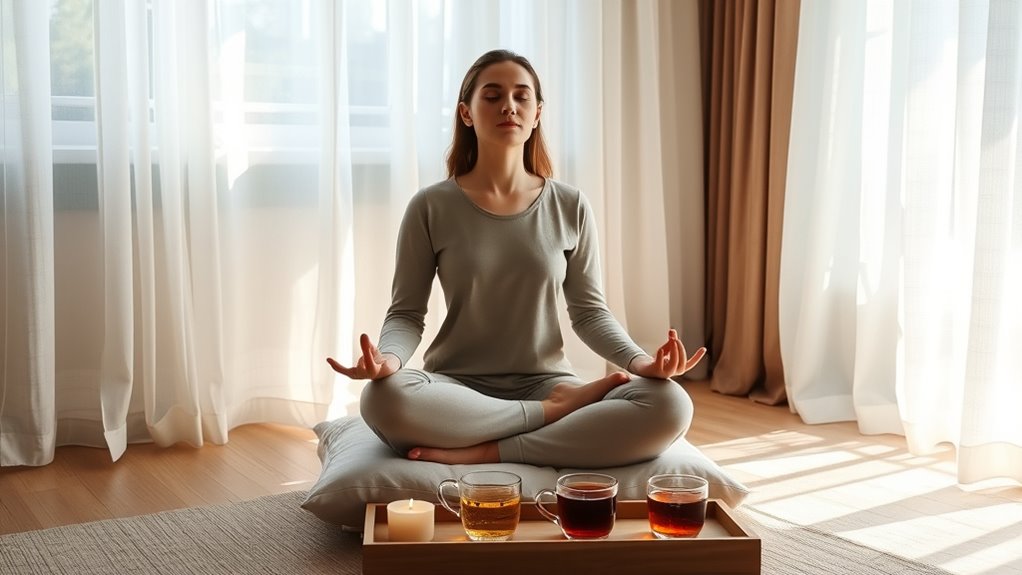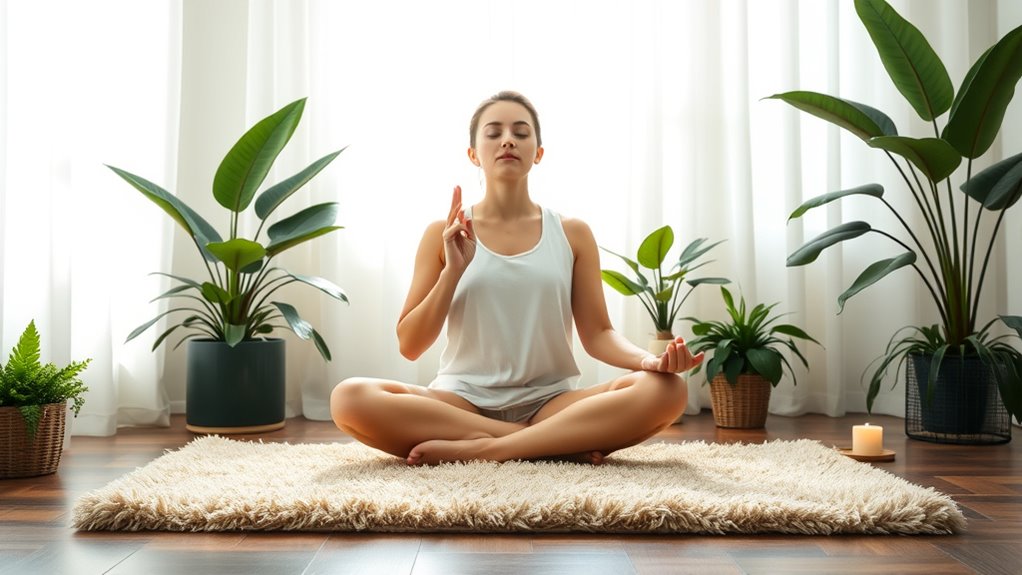Practicing meditation and deep breathing every day can help you manage stress more effectively by calming your mind and body. These techniques activate your relaxation response, lowering your heart rate and stress hormones, and can be done anywhere—in your car, at your desk, or waiting in line. Incorporating mindful breathing into daily routines fosters clarity and calmness, making it easier to handle chaos. Keep exploring to discover simple ways to make these practices a natural part of your life.
Key Takeaways
- Incorporate daily mindfulness and breathing exercises to activate relaxation and reduce stress hormones.
- Practice slow, deep breaths anytime—at work, in transit, or during breaks—to quickly calm the mind.
- Use brief body scans and focused breathing to stay present and prevent overwhelm from worries or deadlines.
- Consistent meditation enhances long-term stress management and emotional regulation.
- No equipment needed—just dedicated moments to breathe deeply and center yourself amid daily chaos.

When daily stresses start to pile up, taking a few moments for meditation or deep breathing can make a noticeable difference. These simple practices help you reset your mind and body, giving you a moment of calm amid chaos. One effective way to do this is by using mindfulness techniques. Mindfulness encourages you to stay present, observe your thoughts without judgment, and focus on your breath or sensations in your body. It’s about grounding yourself in the here and now, rather than being overwhelmed by worries about the future or regrets about the past.
Breathing exercises are particularly accessible and quick to implement. You can do them anywhere — at your desk, in your car, or even in a waiting room. Start by taking slow, deep breaths, inhaling through your nose for a count of four, holding that breath for a count of four, then exhaling slowly through your mouth for a count of four. Repeat this cycle several times. This pattern activates your parasympathetic nervous system, which is responsible for relaxation, helping reduce your heart rate and lower stress hormones. Over time, these breathing exercises can become a go-to tool whenever you feel overwhelmed or anxious.
Practicing simple breathing exercises anywhere can quickly activate relaxation and reduce stress.
Incorporating mindfulness techniques into your daily routine doesn’t require much time or effort. For instance, you might set aside a few minutes in the morning to focus solely on your breath or engage in a brief body scan, paying attention to any areas of tension. During breaks, close your eyes and take a series of mindful breaths, noticing the rise and fall of your chest or the sensation of air moving in and out of your nostrils. These small pauses help create a mental buffer against stress, making it easier to tackle your tasks with clarity and calmness.
You’ll find that consistent practice enhances your ability to manage stress more effectively. When you’re aware of your breathing and stay grounded in mindfulness, you’re less likely to get caught up in negative thought patterns. Instead, you develop a sense of control over your emotional responses, which can substantially improve your overall well-being. Remember, you don’t need special equipment or hours of free time—just a quiet moment and a few mindful breaths can make a big difference in your day. With regular use, these techniques become second nature, helping you stay centered and resilient no matter what life throws your way. Additionally, understanding how sleep impacts cognitive function and emotional regulation can further support your stress management efforts.
Frequently Asked Questions
Can Meditation Replace Medication for Stress Management?
You might wonder if meditation vs medication can fully manage your stress. While meditation and deep breathing are effective alternative stress remedies, they may not replace medication for everyone, especially in severe cases. It’s important to take into account your specific needs. You can try incorporating meditation into your routine to help reduce stress levels, but always consult a healthcare professional before making significant changes to your treatment plan.
How Long Should I Meditate Daily for Optimal Benefits?
Like the story of Goldilocks, finding your ideal meditation time is about balance. For most, 10 to 20 minutes daily provides significant benefits, but the ideal meditation duration varies. Start with a manageable timeframe, then gradually increase until you find what feels right. Consistency matters more than length, so aim for regular practice that fits your schedule, helping you achieve the best possible stress relief.
Are There Specific Breathing Techniques Best for Beginners?
When starting with breathing exercises, you’ll find certain beginner techniques easier to learn and practice regularly. Focus on simple methods like deep belly breathing or box breathing, which are great for beginners. These techniques help you relax and reduce stress quickly. As you get comfortable, you can explore more advanced methods. Consistency is key, so practice your chosen breathing exercises daily to experience the full benefits.
Can Meditation Help With Chronic Anxiety or Depression?
Think of your mind as a stormy sea—you can learn to calm the waves. Meditation, through mindfulness techniques, helps you anchor your thoughts, fostering emotional regulation. While it won’t erase chronic anxiety or depression entirely, it offers a lighthouse guiding you toward stability. Consistent practice can reduce symptoms, giving you a better chance to navigate life’s storms with resilience and clarity.
What Are Common Obstacles When Starting a Meditation Practice?
When starting a meditation practice, you might face common obstacles like mindful distractions that pull your focus away, making it hard to stay present. You may also encounter consistency challenges, struggling to stick with a regular schedule. These hurdles are normal, but with patience, you can develop strategies like setting a dedicated time and gentle reminders to help you stay committed and gradually deepen your practice.
Conclusion
Remember, taking a moment to breathe deeply or meditate each day gently helps you navigate life’s busy currents. These small, soothing practices act like a gentle breeze, easing tension and restoring your calm. With a little consistency, you’ll find yourself feeling more balanced and ready to embrace each moment. So, give yourself permission to pause, breathe, and enjoy the quiet strength that comes from these simple daily habits. Your peaceful mind is just a breath away.









